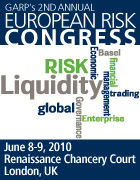1. Markets are always smarter than regulators.
Too much regulation spurs bad innovation. If regulation is onerous, costs of adherence are high, and firms perceive a shift in competitiveness, then expect markets (the good guys and the bad guys) to find ways to circumvent it. Also, much of the day-to-day function at Regulators is focused on magnifying-glass level examination of details; whereas the need here is to have a broader macro-perspective of how “it” all fits together, where “it” is much more than any regulatory form, any individual bank and even the banking system.
2. Are the right products regulated? In the right way?
What is a ‘standard’ derivative, in the context of the move to exchanges and clearing-houses? Standard derivatives didn’t cause the crisis at any individual institution. At a systemic level arguably they did, in the volume and liquidity sense. Complex and exotic products, not regulated because nobody has figured out how, are often the serious offenders.
3. There is as yet no way to measure the overall health, and level of systemic risk, in the market.
Ex-ante, who knows what systemic risk is. Regulators are currently unable to even pull together a comprehensive view of the market. And if we do get a market-level aggregate report, when is the light going to turn from orange to red. Some absolute level decided by the Fed? At the level of each instrument? At the change of the light, will the Fed via individual regulators go back to firms and demand action. What action? And so, are we about to see a hitherto undefined conflict between regulation of an institution versus regulation of the market as a whole?
4. National regulators do not talk to each other, not enough, not effectively
One key lesson from the recent crisis seems to be that risk and flows and financial markets are global, whereas most regulation is national and often nationalistic. This brings another central point to the discussion, a single regulator versus a committee of them.






2 comments:
Great discussion. The issue of markets being smarter than regulators reflects competitive pressures; remember not too long ago when the worry of the day was over whether regulatory burdens (i.e. SOX) endangered New York's preeminence as a financial center?
As for the need for regulators to talk more and take a higher, more systemic view of things, the usual turf issues between agencies certainly complicates things.
Many of these issues were addressed by the Investors Working Group (cosponsored by Council of Institutional Investors and CFA Institute Centre for Financial market Integrity) in their report issued yesterday (copy available at http://cfainstitute.org/aboutus/press/release/09releases/20090715_01.html?intCamp=default_sidebar_iwg_report). Full disclosure: I'm an analyst at the CFA Centre.
A very topical discussion and valid points.
To me though, the essential component of any new regulation is that it gets enacted in the right way, and that the right institutions and the right people within those institutions actually perform the regulation.
The SEC has taken a lot of flack and all the new Bank Holding Companies are ultimately overseen by the FED. So whatever the SEC does the FED will have alot of ultimate oversight, as well as seemingly have systemic risk oversight.
Maybe the regulators need to hire some of the people who actually created exotic products.
Post a Comment